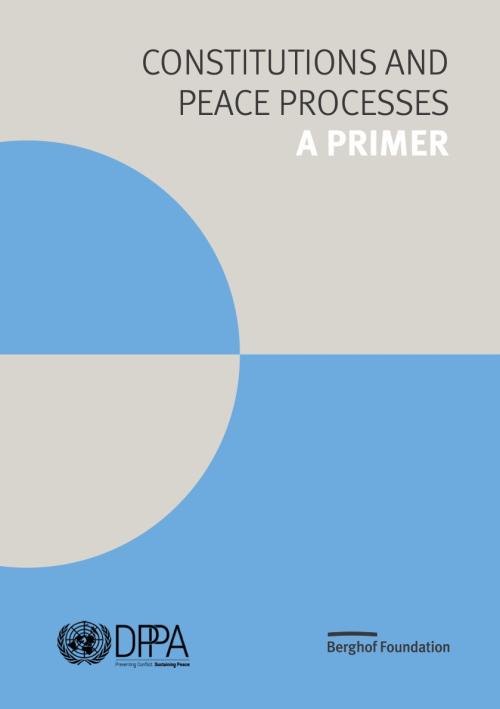This page contains a set of UN guidance materials, reports and other publications related to constitution-making. These include Guidance Notes of the Secretary-General on UN Constitutional Assistance and related subjects as well as guidance documents, reports, papers and databases published by the UN Secretariat and agencies on different aspects of constitution-making such as gender, human rights, civic education and constitutional issues in peace processes.
Secretary-General's Guidance Note on United Nations Constitutional Assistance
This guidance note sets out a policy framework for UN assistance to constitution-making processes derived from lessons learned from constitution-making experiences and from UN engagement in these processes. It identifies the expertise a UN mission will require to effectively assist a constitution-making process, and includes an indicative timeline of events.
Other UN Guidance and Reports on Constitution-Making
This guidance note provides advice and tips, as well as good practice case studies and lessons learned, to assist UNDP practitioners who are designing and implementing support to constitution-making. Part I outlines why UNDP supports constitution-making, building on guidance from the Secretary-General. Part II provides guidance on approaches to designing constitutional assistance, with special emphasis on developing strong partnerships with a range of counterparts. Part III focuses on the technical entry points for assistance. Part IV provides a summary of key lessons learned in constitution-making support.
This guidance note provides an overview of some of the key considerations which UN Women country offices should keep in mind when providing support for the creation or reform of national constitutions. It addresses questions of process, such as the participation of women in constitution-making of governance structures, such the impact of constitutional choices about electoral systems and decentralized power and of substantive content, such as gender equality and non-discrimination guarantees and the constitutional interaction between gender equality and religious or customary laws. The note is divided into three main sections: 1. The constitution-making and constitutional reform processes 2. Constitutional provisions and 3. The role of the UN.
UNDP
This Practical Guidance Note aims to heighten awareness and knowledge of Civic Education within UNDP Country Offices (COs), assist COs by providing practical information and guidance for Civic Education programming, and signpost additional resources and further reading.
Other UN Secretary-General Guidance Notes
This Note provides guidance for the UN system on how to address racial discrimination and protection of minorities in line with the UN Charter, Universal Declaration of Human Rights and other key standards, drawing from effective practices. It makes 19 recommendations to ensure a comprehensive and coherent UN approach from headquarters to regional and country presences.
The present note provides guidance to the UN system on addressing statelessness by outlining the guiding principles and the policy framework for action. The UN engagement in addressing statelessness should be guided by seven principles that support the development, promotion and implementation of international norms relating to statelessness. In addition to the seven guiding principles, the note presents four concrete interrelated action approaches on how the UN system can improve its coordinated response to statelessness.
This note sets out the United Nations framework for democracy based on universal principles, norms and standards, emphasizing the internationally agreed normative content, drawing on lessons learned from experience and outlining the areas of support in which the UN has comparative advantages.
This note provides the guiding principles and framework for UN rule of law activities at the national level that apply in all circumstances, including in crisis, post-crisis, conflict-prevention, conflict, post-conflict and development contexts. In order to ensure a comprehensive and coherent UN approach, the note is derived from United Nations norms, standards and guidance, and the framework outlines the fundamental constituent elements of rule of law efforts.
This note provides the guiding principles and framework for UN justice for children activities at the national level that apply in all circumstances, including in conflict prevention, crisis, post-crisis, conflict, post-conflict and development contexts. It is framed within the UN mandate to support the realization of human rights, poverty reduction and the Millennium Development Goals, and is a contribution to the UN coherence agenda in the rule of law area.


